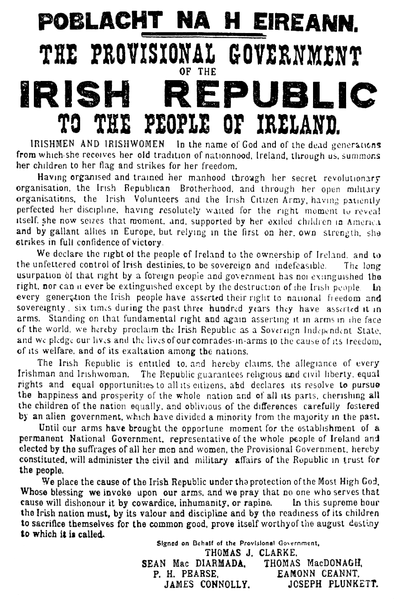
In consideration of the season, following is William Butler Yeats’ famous poem, Easter, 1916. It is both commentary on, and witness to, the Easter Rebellion in Dublin of that year. For those familiar with the events, it needs no commentary; however, I will comment on it nevertheless.
The rebellion occurred nearly two years into the Great War, but the “Irish Question” (so-called) was festering well before the war. In fact, it could be argued that The Troubles” had more to do with Britain’s entry into World War I than any secret alliances His Majesty’s government had argued prior to August of 1914.

Consider this: in the weeks leading up to the outbreak of war, trainbands of volunteer “militia” were forming all over the British Isles, large quantities of munitions were being smuggled into the Emerald Isle and the issue of Irish sovereignty was threatening to break out into open civil war. Add to that the fact that on the eve of war England had a banking crisis and the prospect of a brief war on the continent may have seemed a preferable alternative to the government then in power at 10 Downing Street at the time.
When Britain did enter the war, both the Green and the Orange factions competed to see who could volunteer for service in greater numbers to prove their patriotism, so in a sense the ploy did work—for a time. However the Sinn Fein movement, comparatively small to begin with, did not sympathize with this surge of loyalty to King and Country and during Easter Week of 1916 they launched their ill starred rebellion against the Crown.


The Easter Rebellion was many things: hopeless, quixotic, foolish; but it ultimately proved successful. It was a blood sacrifice which turned Irish opinion away from loyalty to Great Britain and towards the goal of a Republican government.

But the Easter Rebellion also invoked the terrible specter of civil war in Ireland. Of course, this was an old ghost insofar as Ireland was concerned; centuries before the English crown had consciously setting two religious groups against each other in Ireland as strategy for maintaining control.
After World War I, His Majesty’s government would employ the exact same strategy in Palestine to hold on to its conquest from that war—and we can all see how well that worked out.
Easter, 1916
I HAVE met them at close of day
Coming with vivid faces
From counter or desk among grey
Eighteenth-century houses.
I have passed with a nod of the head
Or polite meaningless words,
Or have lingered awhile and said
Polite meaningless words,
And thought before I had done
Of a mocking tale or a gibe
To please a companion
Around the fire at the club,
Being certain that they and I
But lived where motley is worn:
All changed, changed utterly:
A terrible beauty is born.
That woman’s days were spent
In ignorant good-will,
Her nights in argument
Until her voice grew shrill.
What voice more sweet than hers
When, young and beautiful,
She rode to harriers?
This man had kept a school
And rode our winged horse;
This other his helper and friend
Was coming into his force;
He might have won fame in the end,
So sensitive his nature seemed,
So daring and sweet his thought.
This other man I had dreamed
A drunken, vainglorious lout.
He had done most bitter wrong
To some who are near my heart,
Yet I number him in the song;
He, too, has resigned his part
In the casual comedy;
He, too, has been changed in his turn,
Transformed utterly:
A terrible beauty is born.
Hearts with one purpose alone
Through summer and winter seem
Enchanted to a stone
To trouble the living stream.
The horse that comes from the road.
The rider, the birds that range
From cloud to tumbling cloud,
Minute by minute they change;
A shadow of cloud on the stream
Changes minute by minute;
A horse-hoof slides on the brim,
And a horse plashes within it;
The long-legged moor-hens dive,
And hens to moor-cocks call;
Minute by minute they live:
The stone’s in the midst of all.
Too long a sacrifice
Can make a stone of the heart.
O when may it suffice?
That is Heaven’s part, our part
To murmur name upon name,
As a mother names her child
When sleep at last has come
On limbs that had run wild.
What is it but nightfall?
No, no, not night but death;
Was it needless death after all?
For England may keep faith
For all that is done and said.
We know their dream; enough
To know they dreamed and are dead;
And what if excess of love
Bewildered them till they died?
I write it out in a verse –
MacDonagh and MacBride
And Connolly and Pearse
Now and in time to be,
Wherever green is worn,
Are changed, changed utterly:
A terrible beauty is born.
—–William Butler Yeats